CREATIVE RESPONSES TO CORRUPTION IN THE LAND SECTOR
About the webinar
Corruption in the land sector affects every second citizen in Africa, with devastating impacts for individuals, communities and the development of fragile nations. Transparency International has adopted a range of community-led initiatives, which are helping to amplify the voices of women and men affected by land corruption and push for change to systems, structures, practices and cultural norms that allow corruption to flourish in the land sector.










